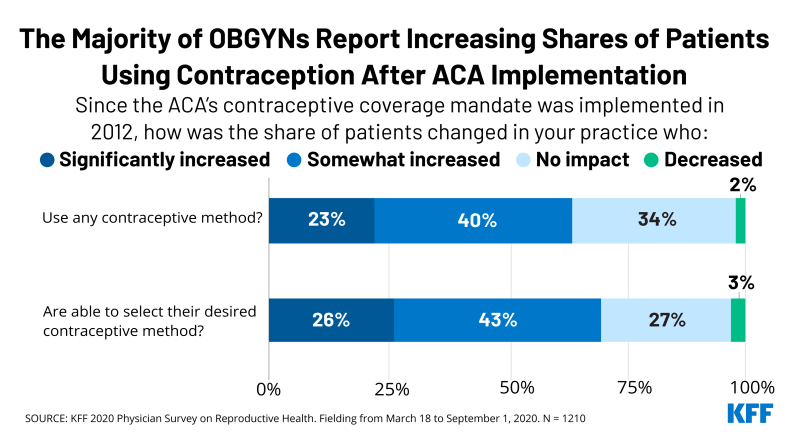
The independent source for health policy research, polling, and news.
Survey: OBGYNs Report That the Affordable Care Act Has Increased Use of Contraceptives Among Patients, but the Cost of Reproductive Health Care Still a Burden for Their Low-Income Patients
As the nation awaits the Supreme Court ruling on the future of the Affordable Care Act (ACA), a 2020 KFF survey of obstetrician-gynecologists (OBGYNs) finds that since implementation of the ACA’s contraceptive coverage requirement, nearly two-thirds of OBGYNs (63%) reported an increase in contraceptive uptake from their patients and 69% reported an increase in their patients use of their desired contraceptive method. However, nearly all OBGYNs (92%) reported the cost of reproductive health care services still presents a challenge for low-income patients.
The survey highlights issues of patient affordability and access to care. About half of OBGYNs found the issue of affordability comes up always or often when discussing treatment or test options with patients. While 78% of OBGYN practices accept Medicaid, physicians report challenges with specialists accepting Medicaid referrals and being reimbursed at a lower rate by the program compared to private insurance.
The survey found that a majority of OBGYNs provided some form of contraceptive care, but just 18% offered all non-permanent contraceptive methods to their patients. Notably, less than half of OBGYNs provide their patients with prescription forms of emergency contraception (copper IUD and Ella).
A limited number of OBGYNs (23%) provide abortions, but they were more commonly offered by OBGYNs in urban areas, the Northeast, and the West. The most frequently reported reasons for not providing abortion included their practice had policies against it (49%), that abortion services were available elsewhere (45%), and personal opposition (31%).
When asked about career satisfaction, 70% of OBGYNs reported they would choose the same medical specialty, while a minority reported they would choose a different specialty (19%) or not be a physician at all (10%).
For additional findings read the full report, OBGYNs and the Provision of Sexual and Reproductive Health Care: Key Findings from a National Survey.
Methodology
The 2020 KFF National Physician Survey on Reproductive Health surveyed 1,210 OBGYNs from March 18 to September 1, 2020. The survey received responses from a nationally representative sample of OBGYNs practicing in the U.S. who provide sexual and reproductive health care to patients. Following the beginning of the COVID-19 pandemic, additional questions were added regarding the impact of COVID-19. You can find the results here: How OBGYNs Adapted Provision of Sexual and Reproductive Health Care During the COVID-19 Pandemic.
